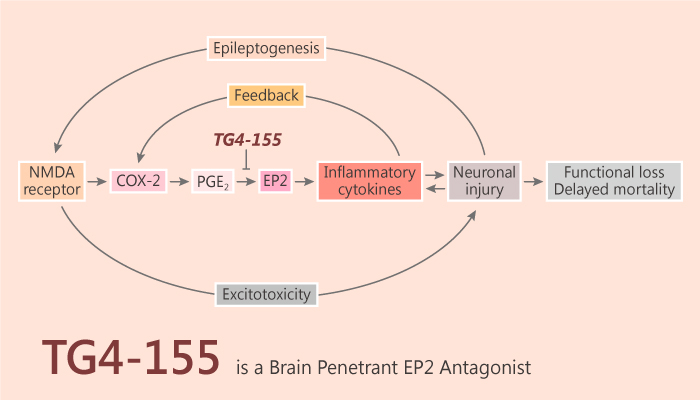Prostaglandin EP2 receptor (PGE2) is a potential neuroprotection target in epilepsy and other inflammation-related neurological disorders. Activation of PGE2 subtype EP2 promotes inflammation. The EP2 receptor widely expresses in both neurons and glia. Neuronal EP2 activation appears to mediate some beneficial effects. These effects include PKA-dependent neuroprotection in acute models of ischemia and excitotoxicity, and promotion of spatial learning. Taking advantage of EP2 antagonist TG4-155, researchers study the pharmacological effect of selective EP2 inhibition in the prostate cancer cells. First, researchers evaluate the selectivity of TG4-155 for EP2 receptor against other prostanoid receptors in cell-based functional assays. As a result, TG4-155 shows low nanomolar antagonist activity against only EP2 and DP1.

TG4-155 inhibits the serotonin 5-HT2B receptor with an IC50 of 2.6 µM and hERG with an IC50 of 12 µM. Researchers further demonstrate the involvement of EP2 receptor in cancer cell proliferation and invasion and an inflammatory cascade among these cancer cells. TG4-155 causes robust inhibition of the EP2 response to butaprost in C6G-EP2 cells. In particular, TG4-155 displays a high affinity to human EP2 receptors with a Ki of 15 nM in the radioligand binding assay. Moreover, TG4-155 displays robust inhibition of PGE2-induced cAMP accumulation in C6G cells stably expressing mouse EP2 receptor (C6G-mEP2) in a dose-dependent manner with a KB value of 4.7 nM. Besides, TG4-155 displays a bioavailability of 61% (i.p. route compared with i.v.), a plasma half-life of 0.6 h, and a brain/plasma ratio of 0.3 in mice after i.p. administration.
All in all, TG4-155 is a potent and selective EP2 antagonist for cancer cell proliferation, invasion, and inflammation.